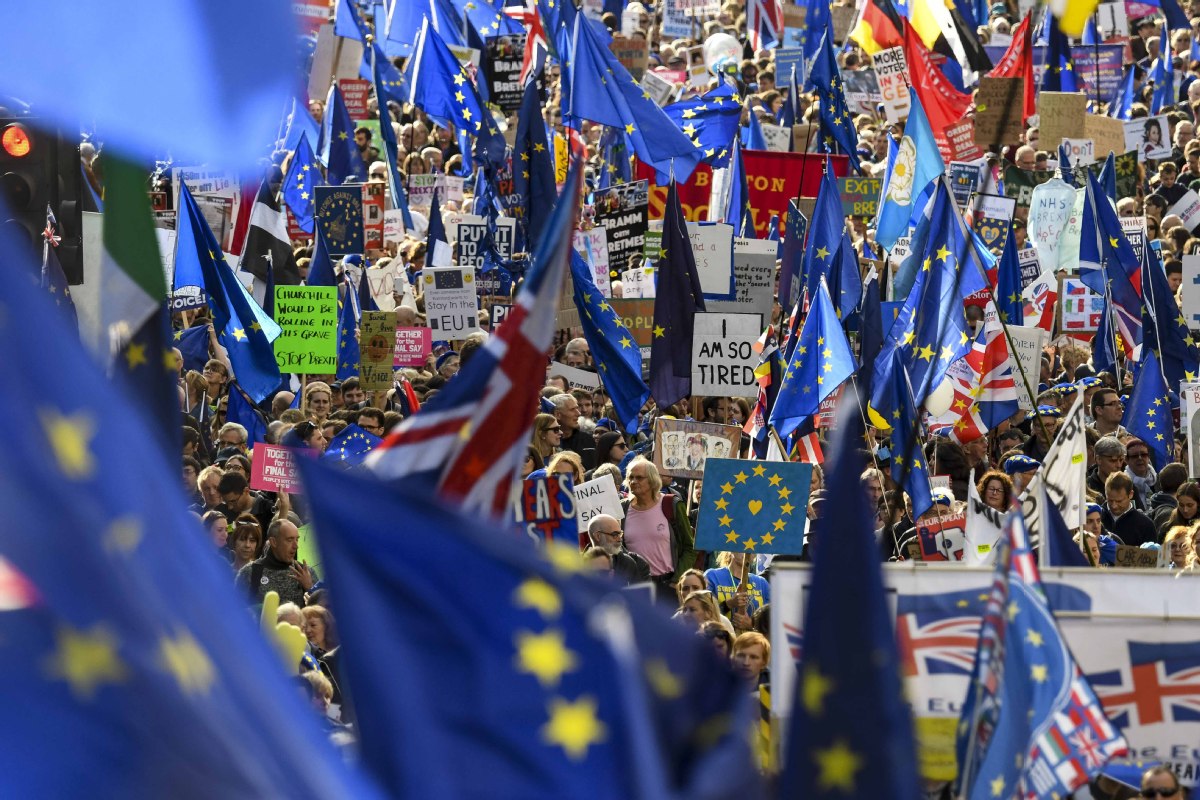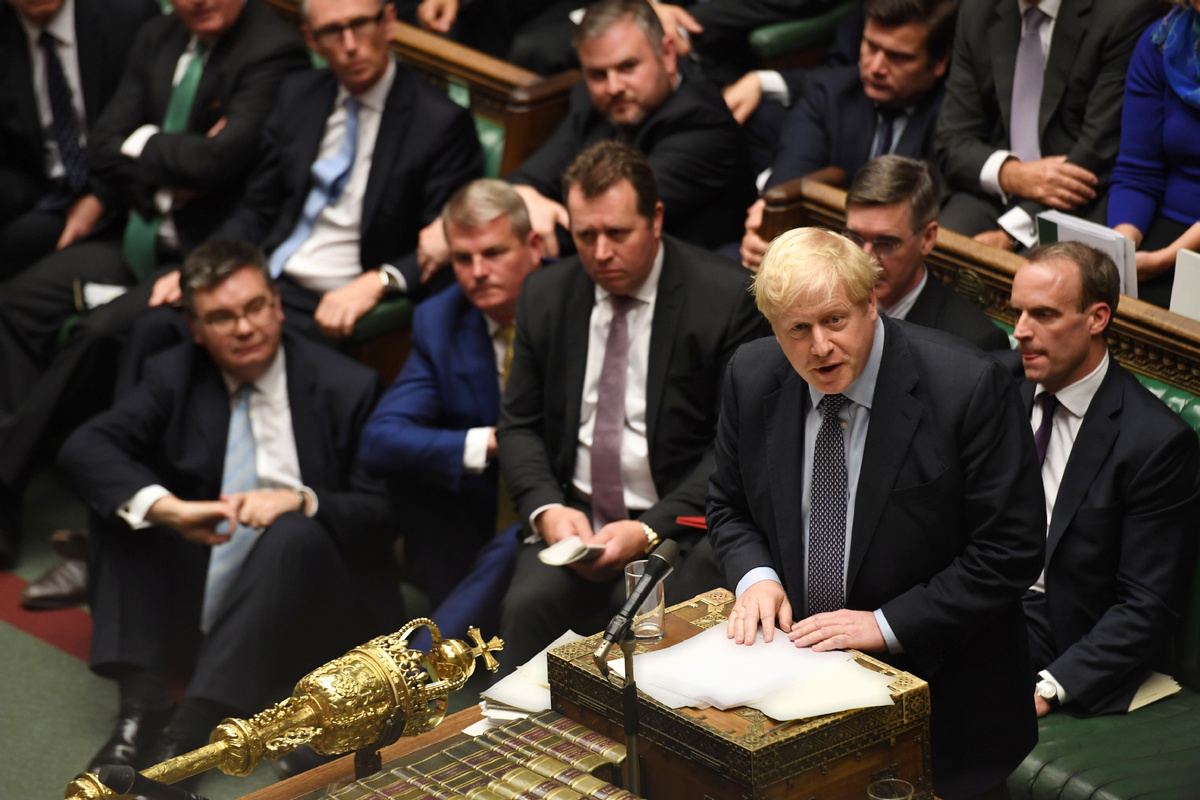EU to consult on request from London for Brexit extension
By Earle Gale and Bo Leung in London | China Daily Global | Updated: 2019-10-21 09:15

British prime minister refuses to sign letter, says he believes a delay would be a mistake
The European Union has received a letter from London requesting a Brexit extension, said Donald Tusk, the president of the European Council, on Saturday.
"The extension request has just arrived. I will now start consulting EU leaders on how to react," Tusk said on his Twitter account.
The letter from British Prime Minister Boris Johnson, who refused to sign it, requested a further extension to the Article 50 negotiating period to Jan 31, 2020.
The request was accompanied by a second letter, signed by Johnson, that said he believed a delay would be a mistake, British media reported.
The British Parliament voted 322-306 in favor of an amendment on Saturday intended to force Johnson to seek a Brexit delay.
In a special Saturday sitting, the first in 37 years, members of Parliament backed a motion to withhold support for Johnson's Brexit deal until legislation to implement it has passed.
However, Michael Gove, the minister in charge of no-deal Brexit preparations, told SkyNews, "We are going to leave by October 31. We have the means and the ability to do so."
The prime minister was legally obliged to ask the EU for an extension until the end of January 2020 after he had failed to win approval for his deal by a deadline of 11 pm on Saturday.
The amendment, put forward by Oliver Letwin, a former Conservative lawmaker who is now an independent, meant that Parliament did not vote on whether to approve Johnson's agreement.

But Johnson told Parliament after the vote, "I will not negotiate a delay with the EU, and neither does the law compel me to do so," according to British media.
The prime minister said he was not "daunted or dismayed" by the defeat, and would press ahead with introducing Brexit legislation this week.
Opposition Labour leader Jeremy Corbyn said the prime minister "must now comply with the law. He can no longer use the threat of a no-deal crash-out to blackmail (members of Parliament) to support his sellout deal".
The vote in the British Parliament on Saturday was the culmination of a process that began more than three years earlier - on June 23, 2016 - when the people of the United Kingdom voted in a referendum on whether the United Kingdom should remain a member of the European Union or leave.
The simple yes/no question split the nation, with around half wanting to remain and half choosing to leave.
The answer itself - leave - invited further questions: Should the UK make a clean break? Should it continue to be a close trading partner of the EU's? Or should it remain so close that it follows EU rules?
Because those questions were not asked in the 2016 referendum, British politicians have argued ever since about what they think the British people really want.
The deal that members of Parliament considered on Saturday was Prime Minister Johnson's vision of what was best for Britain.
It was an agreement that was largely the same as the one negotiated by former prime minister Theresa May. The main difference between them was the way in which Johnson aimed to avoid a post-Brexit hard border between Northern Ireland and the Republic of Ireland. He favored introducing customs checks away from the border, while May's proposal, which Parliament rejected three times, called for Northern Ireland to effectively remain in the EU until a trade deal could be signed - the so-called Irish backstop - which was controversial because it meant different parts of the UK would be treated differently.
Johnson's deal, like May's, called for the UK to be free to strike trade deals with other countries, and for a transitional period, during which all of the EU rules would be followed, through the end of December 2020.
In both deals, UK citizens living in EU countries and EU citizens living in the UK would keep their residency rights and their social security entitlements.
In Saturday's vote, the stakes were high for Johnson. He knew that losing would mean having to abide by the Benn Act, which requires Johnson to ask the EU for an extension to the Article 50 negotiating period and submit a letter to the EU seeking an extension beyond the Oct 31 deadline, until the end of January. This would allow time for more talks, something Johnson had previously said he "would rather be dead in a ditch" than do.
The BBC's political editor, Laura Kuenssberg, had predicted that Johnson, were he to lose, would try to avoid asking for an extension by demanding the dissolution of Parliament and a general election.
Ahead of the vote, it was clear the numbers would be tight.
Johnson put his efforts into winning the support of the 23 maverick Conservative Party members of Parliament he had expelled for voting against him, and into persuading opposition party MPs to support him, especially those from areas where the public wants an EU exit.
Ahead of the vote, Labour Party MP Ronnie Campbell summed up why some opposition lawmakers were planning to support the government when he told the BBC program Newsnight, "I think this country's just fed up with the way Parliament's run this for the last three years."
Xinhua contributed to this story.
























